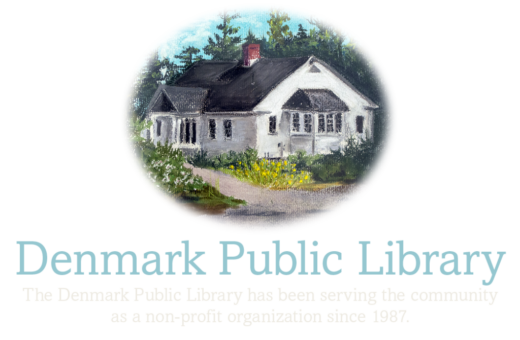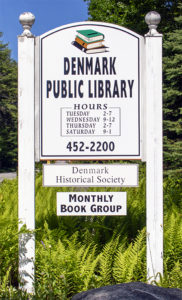DENMARK PUBLIC LIBRARY
COLLECTION DEVELOPMENT
PURPOSE OF THE COLLECTION
The purpose of the Denmark Public Library (DPL) materials collection is to provide resources to assist individuals in their pursuit of educational objectives, intellectual and emotional growth, the enjoyment of leisure time and practical solutions to daily problems. The library is responsible to its potential constituency to announce this purpose statement, to evaluate and alter it as the community changes and to increase the opportunity for all potential users of its resources to achieve their purposes through the library.
The library keeps the collection vital and useful by retaining or replacing essential materials, and by removing, on a systematic and continuous basis, those works that are worn, outdated, of little historical significance, or no longer in demand. Materials that are removed from the library collection may be made available for public purchase at book sales.
The DPL endeavors to build a collection representing varying points of view. The choice of library materials by users is an individual matter. Responsibility for the reading materials of children and adolescents rests with their parents or legal guardians. While a person may reject materials for himself or herself and for his or her children, he or she cannot exercise censorship to restrict access to the materials by others. The library supports intellectual freedom and has adopted the following statements as policy: ALA Freedom to Read Statement, American Library Association (ALA) Library Bill of Rights, and the “Freedom to View” statement of the American Film and Video Association.
Requests for reconsideration may be made only by registered patrons, and shall be made in writing and given to the Librarian for a written response. Appeals are directed to the Board for the final decision.
The Purpose Statement assumes specific definitions for the term “Resources” and for the four categories of activity to which these resources are directed. The term “Resource” includes:
- Print and non-print materials available within the Library
- Electronic database sources
- Resources in other libraries or locations to which the library may achieve access through interlibrary loan
These resources respond to four categories of activity:
- Resources for Education
- Resources for Emotional and Intellectual Growth
- Resources that Enhance the Enjoyment of Leisure Time
- Resources that Assist in the Practical Solution of Daily Problems
DEFINITION OF PATRON NEEDS TO BE ADDRESSED BY THE LIBRARY
The library acknowledges that each person has information needs that are important to that individual. It also recognizes that it has limited financial resources to respond to these needs. The library has a responsibility to use public funds in ways that are advantageous to the largest number of its constituents. The Library will refer patrons to other sources of information to meet their needs where possible.
SELECTION RESPONSIBILITY
The responsibility for book selection rests with the library, operating within the framework of the policies enunciated herein, and adhering to generally accepted professional practices.
Copyright Restrictions
The copyright laws of the United States (Title 17, United States Code) govern the reproduction, distribution, adaptation, public performance, and public display of protected material.
Under certain conditions, public libraries are authorized to lend, lease, or rent copies of computer programs and videotapes to patrons for nonprofit purposes. Any person who makes an unauthorized copy or adaptation of a computer program or videotape or redistributes the loaned copy or publicly performs or displays the computer program or videotape, except as permitted by Title 17 of the United States Code, may be liable for copyright infringement.
This institution reserves the right to refuse to fulfill a loan request if, in its judgment, fulfillment of the request would likely lead to violation of the copyright law.
MATERIALS SELECTION
Selection is the decision to add, retain or delete material as part of the library’s resource collection. All materials, whether purchased by the library or donated to it, are evaluated in accordance with these guidelines. Each item is evaluated on its significance as an entire work rather than upon the merit of individual parts. Selection decisions may be made upon one or a combination of guidelines as applicable to the item in question. Guidelines used by the DPL to evaluate materials to be selected for its collection include:
- The needs of the community.
- The overall balance of the collection.
- The spirit of service and the philosophy of the library.
- The availability of material from other sources.
- Budgetary limitations.
- Suitability of the format of the item for library use.
- Relation to existing collection and other material on the subject.
- Reputation or significance of the author.
- Reviews in professional literature or patron request.
- Accuracy of the item.
- Appearance in standard bibliographies and indexes
- In-print availability.
- Literary merit.
- Locally produced or authored material.
- Price
- Suitability of reading level, interest level and treatment of subject to the age of the intended audience.
Selection Tools
Because it is impossible for librarians to examine all items being considered for purchase, they depend on reliable selection aids. The librarians regularly depend on the reviews found in standard sources.
Non-Book Materials
The criteria for and the methods of selection of non-book materials are the same as for books.
Non-book items purchased by the library for in-house use or for circulation may include pamphlets, compact disc recordings, DVDs and puzzles.
Collection Maintenance
Duplicate Copies
The number of copies purchased varies with the expected use of any item.
Weeding
In order to maintain the best possible collection of materials, a continual weeding process takes place. Items are discarded if they are outdated, if they no longer circulate, if there are more duplicate copies than needed, or if they are in poor physical condition. Items discarded are placed in the Library’s used book sale.
DISPOSAL OF SURPLUS LIBRARY MATERIAL
Library property (i.e. print and non-print materials, equipment, supplies and or any personal property) which in the judgment of the Librarian is no longer necessary or useful for library purposes, may be disposed of in the following manner:
- Books and non-print materials from the library’s collection or gift materials may be discarded, sold, or, upon the approval of the Librarian and based on the guidance of the Board, be given to local philanthropic, educational, cultural, government or other not-for-profit organizations.
- Any other personal property having an individual current value of less than $100 may, at the discretion of the Librarian, be discarded, turned in on new equipment or made available for sale in accordance with the policies of the Board.
- No favoritism shall be shown to library employees, members of the Library Board or members of their immediate families who make bids on or purchase any library item declared surplus.
Revision of Selection Policy
Because the needs of the community change, this materials selection policy is revised as needed and/or is reviewed as needed years.
Patron Requests
The library welcomes patron interest in the collection and will seriously consider all requests that specific materials be acquired. The library is under no obligation to fill any particular request if not deemed suitable to the collection. Patron requests will be reviewed using the materials selection criteria listed above.
Donations, Gifts and Memorials
General
The DPL is grateful for gifts, and its collection has been enriched by donations of materials as well as by contributions. Through donors, the library has been able to acquire materials which could not have been purchased otherwise.
Donation of Books and Audio Visual Materials
In accepting a gift of materials, the library reserves the privilege of deciding whether items donated should be added to the collection. Out of the many books and other materials which citizens so generously give, a considerable proportion can be used. Some materials cannot be used because any library material, though of value in itself, may be: (1) a duplicate of an item of which the library already has a sufficient number; (2) outdated–interesting but not of sufficient present reference or circulating value to the library; and/or (3) in poor condition–which would not justify the expense of processing it, i.e. cataloging and preparing it for circulation. The material will be judged by the same standards of selection as those applied to the purchase of new materials. The DPL accepts gift books with the understanding that books which are useful to the library collection will be retained and other books disposed of in whatever manner the librarian deems best. The Library necessarily reserves the right to interfile gifts with other collections on the same subject, so that all collections are organized and classified according to library standards for the best public service.
Gift Book Program
The Library welcomes monetary contributions specifically for book purchases in memorial to or in honor of named individuals.
Donation of Art Objects and Other Types of Materials
Although such gifts are usually welcomed and valued, final decision on their acceptance rests with the Librarian and the Board of Library Trustees.
Donations—Others, e.g. Monetary
The Library welcomes cash contributions, gifts of real property, stocks, and bonds. It is our custom to expend cash gifts on materials, equipment, or a project which is acceptable to the donor. Although it is unlikely, there may be an occasion in which the restrictions set by the donor make it impossible for the library to accept the contribution. All donations are subject to the approval of the Library Director with the backing of the Library Board of Library Trustees.
Recognition of Gifts
For memorial books to the library, the library may place within the book the name of the donor, if desired.
Use of Gifts
All gifts are accepted with the understanding that it may someday be necessary that they be sold or disposed of in the best interest of the library. The Library cannot commit itself to perpetually housing a donation.
Income Tax Statements
The library cannot appraise the value of a donation of materials or art. It will, however, issue the donor a letter acknowledging the donation. It is the donor’s decision whether he or she will determine the value of the donation or utilize an independent appraiser. The gifts to the Library as a non-profit organization qualify as tax deductible.
Restriction
No donation can be accepted unless it is given to the library without restrictions unless the Board of Library Trustees has specifically adopted an agreement to do so. All gifts may be used, sold, or disposed of in the best interest of the library. All donations are accepted only if, in the opinion of the Library Director and the Board of Library Trustees, they are in the best interests of the library.
Request for Reconsideration of Materials
Strong objection to any library materials must be made in writing according to “Procedures for Handling Complaints about Library Materials” provided in the attachments. Examination and reconsideration of materials, if necessary, will be handled as outlined in these procedures. A copy of these procedures as well as forms for registering complaints may be obtained from the Librarian.
The DPL subscribes to the provisions of the Library Bill of Rights and the Freedom to Read Statement as adopted by the American Library Association. These documents are considered a part of this policy. All individuals have the right to choose which library materials they will use. However, no one has the right to restrict the freedom of others to read whatever they wish. No book or other material in question is automatically removed from the collection because of an objection to it.
Approved by the Denmark Public Library Board of Trustees March 9, 2023

